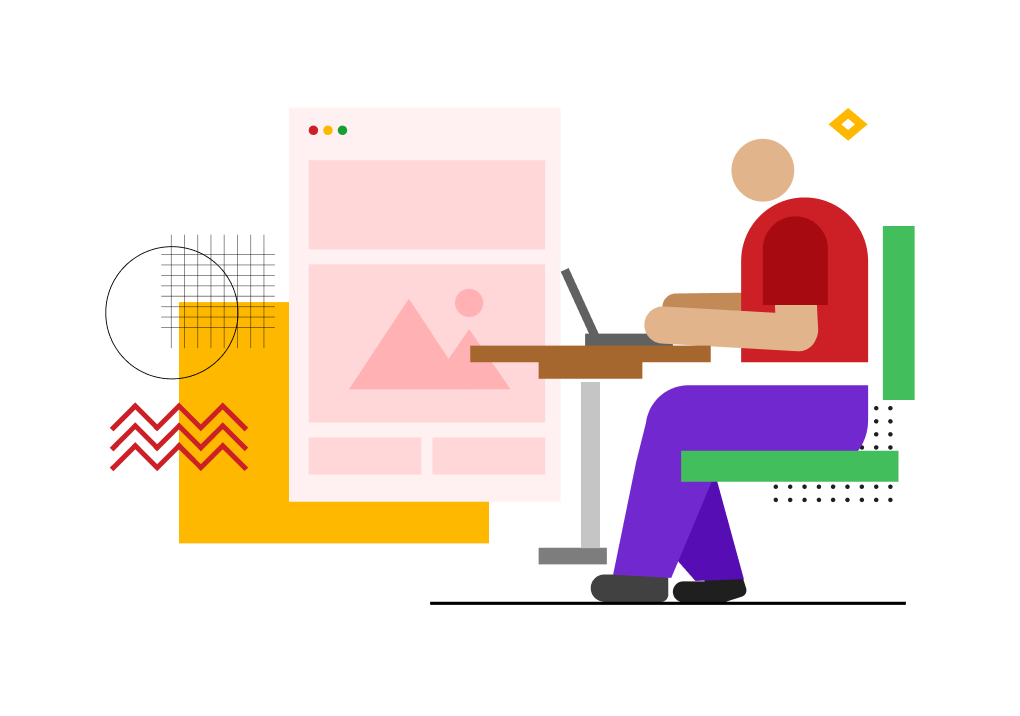There’s this intern in our studio who said that she had always been interested in UX Design but missed her opportunity to break into the field since she’s pursuing a triple major degree in Arts and doesn’t have the financial resources to shift to a Design school.But this is not the case as there are many living proofs who have been able to learn UX Design without any formal training! The role of a UX Designer has been gaining prominence in recent times. Students and professionals from all walks of life have been changing tracks to get into one of the fastest growing careers. Making a career in the field of Design does not necessarily require formal education(although it can help build a solid foundation). But there are other ways to get ahead of the curve.So to break the false belief that it is “too late” to learn Design, here’s a comprehensive for getting started:
A. BUILD
1. Core Skills
research techniques
ethnography and discovery—user goals, motivations, and work patterns
user modeling—persona and scenario creation; role-playing
product design—product-level interaction principles and concepts
interaction design—function-level interaction principles and concepts
interface design—component-level interaction principles and concepts
information architecture and information design—content structure and presentation principles
2. Business Skills
project management
time management
stakeholder or client management
basic business writing—letters, email messages, meeting notes, and summaries
3. Communications Skills
rhetoric and persuasive writing
expository writing and composition
technical writing
public speaking and presenting
visual communication
4. Interpersonal Skills
mediation and facilitation
active listening
interviewing and observation
team-building
collaboration
5. Usability Skills
knowledge of usability testing principles and methods
knowledge of principles of cognitive psychology
6. Media Skills
understanding of bit-depth, pixel-density, and resolution issues
managing color palettes
icon design and pixel-level design
graphic user interface (GUI) screen layout and composition
page layout and composition
animation
sound design
prototyping—paper, Visual Basic, HTML/CSS, Director, Flash, or other methods
knowledge of file formats and tradeoffs
7. Technical Skills
understanding of basic computer programming principles, tools, and technologies
GUI development principles, tools, and technologies
database principles, tools, and technologies
understanding of software and hardware development processes—specification, coding, and testing
knowledge of existing and new technologies and constraints
knowledge of mechanical engineering and manufacturing—for hardware devices
8. Tools Skills
PowerPoint or Keynote
Visio or OmniGraffle
Adobe Creative Suite
9. Personal Attributes
empathy
passion
humor
skepticism
analytical thinking
ability to synthesize information and identify salient points
ability to visualize solutions—before they are built
B. READ
Don’t Make Me Think: A Common Sense Approach to Web Usability – Steve Krug
The Design of Everyday Things – Don Norman<
Seductive Interaction Design: Creating Playful, Fun, and Effective User Experiences – Stephen P. Anderson
Emotional Design: Why We Love (or Hate) Everyday Things – Don Norman
100 Things Every Designer Needs to Know About People – Susan Weinschenk
Universal Principles of Design: 125 Ways to Enhance Usability, Influence Perception, Increase Appeal – William Lidwell
Hooked: How to Build Habit-Forming Products – Nir Eyal
About Face 3: The Essentials of Interaction Design – Alan Cooper
Information Architecture for the World Wide Web – Morville & Rosenfeld
A Project Guide to UX Design – Unger & Chandler
Communicating Design – Brown
Observing the User Experience – Goodman, Kuniavsky, Moed
Prototyping – Zaki Warfel
Designing Interfaces – Tidwell
Thinking, Fast and Slow – Daniel Kahneman
Lean UX: Applying Lean Principles to Improve User Experience – Jeff Gothelf with Josh Seiden
The Paradox of Choice: Why More Is Less – Barry Schwartz
Designing Visual Interfaces: Communication Oriented Techniques – Kevin Mullet
Sprint – Jake Knapp
Rework – Jason Fried and David Heinemeier Hansson
Creative Confidence – Tom Kelley and David Kelley
Tools of Titans: The Tactics, Routines, and Habits of Billionaires, Icons, and World-Class Performers – Tim Ferriss
The War of Art: Break Through the Blocks and Win Your Inner Creative Battles – Steven Pressfield
C. WATCH
Eames: The Architect and the Painter
Design is One: Lella & Massimo Vignelli
Typeface
Objectified
Helvetica
Milton Glaser: To Inform and Delight
D. GET INSPIRED
Site Inspire: siteinspire.com
Design Made In Germany: Sites we like
Little Big Details: littlebigdetails.com
Designs With Context: explanatic.com
Hover States: hoverstat.es
Dribbble: dribbble.com
Awwwards: awwwards.com
Design Shack: Critique Article Archive | Design Shack
Ecogex Delectable: Delectable – Contemporary web design database
The Fox Is Black: thefoxisblack.com
But Does It Float: butdoesitfloat.com
Lovely Package: lovelypackage.com
Form Fifty Five: formfiftyfive.com
One Page Love: onepagelove.com
Web Creme: webcreme.com
Web Designer Pad – webdesignerpad.com
Smashing Magazine: smashingmagazine.com
Synaptic Stimuli: synapticstimuli.com
Design Hash: designhash.com
Behance: behance.net
Very Nice Sites: verynicesites.com
In addition to the above hacks, at Designerrs, we provide a safe learning space for designers across the world. We are trying to make design education accessible for everyone by providing learning experiences and training programs for User Experience and User Interface Design, Design Thinking, Interaction Design, Visual Design, Designing for Immersive Experience (VR, AR, XR), Voice UX, and other specializations. offers a great curriculum to get you up to speed across all fronts. If you’re itching to establish yourself in UX Design sooner rather than later, check the Full Stack UX Design Course. where you get personalised mentorship from design industry experts from Samsung, Microsoft, NID and IIT’s and also get UI/UX Design Certification.
